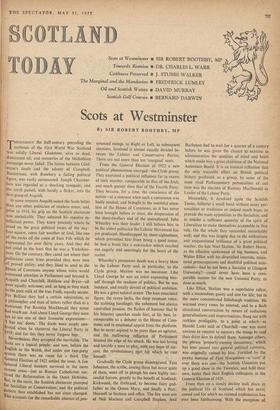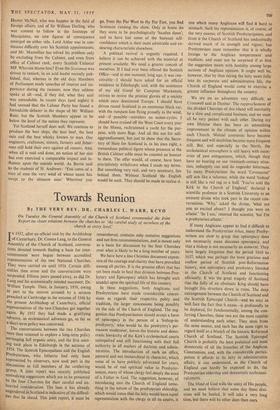TODAY
Scots at Westminster Towards Reunion Caithness Preserved The Marginal and the Mandarins Oil and Scottish Waters Scottish Golf CoUrses
w SIR ROBERT BOOTHBY, MP ✓ DR. CHARLES L. WARR • J. STUBBS WALKER • FREDERICK LUMLEY w DAVID MURRAY • BERNARD DARWIN
Scots at Westminster
By SIR ROBERT BOOTHBY,, MP !THROUGHOUT the half-century preceding the 1 outbreak of the First World War Scotland was solidly Liberal. Gladstone, alive or dead, dominated all; and memories of the Midlothian campaign never faded. The hiatus between Glad- stone's death and the advent of Campbell- Bannerman, with Rosebery a fading political figure, was easily surmounted. Joseph Chamber- lain was regarded as a shocking renegade; and the torch passed, with hardly a flicker, into the firm grasp of Asquith.
In some respects Asquith suited the Scots better than any other politician of modern times; and, prior to 1914, his grip on the Scottish electorate Was unshakable. They admired his massive in- tellectual power. They knew precisely where he Istood on the great political issues of the day : four-square, come fair weather or foul, like one of the rocks off the coast of East Fife which he represented for over thirty years. And they did not mind in the least that he was a Yorkshire- man. On the contrary, they cared not where their politicians came from provided they were men of proved ability; and they liked to send to the House of Commons anyone whose voice would command attention in Parliament and beyond it. Asquith and Churchill, Haldane and Bryce—all Were equally welcome; and, so long as they stuck to the pure milk of the true Faith, equally secure. Vor Balfour they had a certain admiration, as a philosopher and man of letters rather than as a statesman. For Ramsay MacDonald they never had much use. And about Lloyd George they were aPt to use one of their favourite expressions— I hae ma' doots.' The doots were amply con- firmed when he shattered the Liberal Party in 11918; and for this they never forgave hirn. Nevertheless, they accepted the inevitable. The Scots are a logical people; and saw, before the English or the Welsh, that under our two-party system there was no room for a third. The General Election of 1922 settled the issue. A few tattered Liberal banners survived in the more remote areas—just as Roman Catholicism sur- Vived. the Reformation in the Outer Hebrides. But, in the main, the Scottish electorate plumped for Socialism or Conservatism; and the political Pattern then established has not since changed. This accounts for the remarkable absence of pro- nounced swings, to Right or Left, in subsequent elections. Scotland is almost equally divided be- tween the Labour and Conservative Parties. There are not more than ten `marginal' seats.
From the General Election of 1922 a new political phenomenon emerged—the Clyde group.
They exercised a political influence far in excess of their number, comparable to that of the Irish, and much greater than that of the Fourth Party.
They became, for a time, the conscience of the nation—at a moment when such a conscience was badly needed; and brought to the resehtful atten- tion of the House of Commons, as it has never been brought before or since, the desperation of the slum-dwellers and of the unemployed. John Wheatley was their leader. I still believe him to be the ablest politician the Labour Movement has yet produced. Handicapped by short-sightedness, which prevented him from being a good mixer, he had a brain like a nutcracker which reached out eagerly and unerringly, for the heart of the matter.
Wheatley's premature death was a heavy blow to the Labour Party and, in particular, to the Clyde group. Maxton was no successor. Like Lloyd George he was an artist expressing him- self through the medium of politics. But he was indolent, and totally devoid of political ambition. He was a great natural orator. The lean emaciated figure, the raven locks, the deep resonant voice, the stabbing forefinger, the vehement but always controlled passion, the flashes of humour that lit his bitterest speeches made him, at his best, in- comparable as a debater in the House of Com- mons and in emotional appeal from the platform. But he never aspired tosbe more than an agitator, _ and the mellowing infIttence of parliament blunted the edge of his attack. He was too loving and lovable a man to play, with, any hope of suc- cess, the revolutionary Ort far which he cast. himself.
Gradually the Clyde group disintegrated. Torn Johnston, the scribe, among them but never quite of them, went off to plough his own highly suc- cessful furrow, greatly to the benefit of Scotland; Kirkwood, the firebrand, to become fairy god- father to the Queen Mary, and finally a Peer; Shinwell to Seaham and office. The fire went out of Neil Maclean and Campbell Stephen. And Buchanan had to wait for a quarter of a century before he was given the chance to exercise in administration the qualities of mind and heart which made him a great chairman of the National Assistance Board. It is an ironical reflection that the only traceable effect on British political history produced, as a group, by some of the most vivid Parliamentary personalities of our time was the election of Ramsay MacDonald as Leader of the Labour Party.
Meanwhile, it devolved updn the Scottish Tories, hitherto a small band without many per- sonalities or traditions or indeed much hope, to provide the main opposition to the Socialists; and to imbibe a sufficient quantity of the spirit of Liberalism to make themselves acceptable in that role. On the whole they succeeded remarkably well; and this was largely due to the enthusiasm and unquestioned brilliance of a great political teacher, the late Noel Skelton. Sir Robert Home, as the effective spokesman of big business, and Walter Elliot with his diversified interests, minis- terial preoccupations and doubtful political ante- cedents—had he not been a Socialist at Glasgow University?—could never have been a com- parable mentor for the new Unionist Party, or done as much.
Like Elliot, Skelton was a superlative talker, with a tremendous gaiety and zest for life; but in the more concentrated Edinburgh tradition. He warmed every room he entered; and in a flash stimulated conversation by means of audacious generalisations and improvisations, flung out with reckless prodigality, to a point at which—as Harold. Laski said of Churchill—one was more anxious to commit to memory the things he said than drive him to defend them. Amongst others, the phrase 'property-owning democracy,' which has now passed into general political currency, was originally coined- by him. Fortified by the pawky humour of Fred Macquisten—a `card' if ever there was one—the Scottish Unionists put up a good show in the Twenties; and held their own, better than their English colleagues, in the General Election of 1929.
From then on a steady decline took place in the political life of Scotland which has never ceased and for which no rational explanation hall ever been forthcoming. With the exception a Hector McNeil, who was happier in the field of foreign affairs, and of Sir William Darling, who was content to follow in the footsteps of Macquisten, no new figures of consequence emerged on either side. Lord Attlee was in con- tinuous difficulty over his Scottish appointments; and Mr. Macmillan has solved his problem only by .excluding from the Cabinet, and even from office of Cabinet rank, every Scottish Unionist MP. Who can blame him? Even the Scotsman was driven to remark, in an acid leader recently pub- lished, that, whereas in the old days Members of Parliament made speeches of interest and im- portance during the recesses, now they seldom spoke at all—and, if they did, what they said was unreadable. In recent days (and nights) it had seemed that the Labour Party has found a formidable debater in the shape of Mr. William Ross; but the Scottish Members appear to be below the level of the nation they represent.
Yet Scotland herself does well. We continue to produce the best ships, the best beef, the best oats and the best whisky known to man. Our engineers, craftsmen, miners, farmers and fisher- men still hold their own against all corners. And, when all is said and done, no nation of her size has ever exercised a comparable impact and in- fluence upon the outside world. As Barrie said to the students of St. Andrews: 'You come of a race of men the very wind of whose name has swept to the ultimate seas:' Wherever you go, from the Far West to the Far East, you find Scotsmen running the show. Only at home do they seem to be psychologically 'hauden doon'; and to have lost some of the buoyant self- confidence which is their most admirable and en- dearing characteristic elsewhere.
A political revival is urgently required. I believe it can be achieved with the material at present available. We need a greater conceit of ourselves. If I had ever been offered the Scottish Office—and at one moment, long ago, it was con- ceivable—I should have asked for an official residence in Edinburgh; and, with the assistance of my old friend Sir Compton Mackenzie, striven to revive the pristine glories of a society which once dominated Europe. I should have driven round Scotland in an enormous black car, with the rampant lion flying proudly in the wind, and—if possible—outriders on motor-cycles. I should have cruised off the West Coast every year in the Minna, rechristened a yacht for the pur- pose, with more flags. And all this not for self- aggrandisement, but just to show that the Secre- tary of State for Scotland is, in his own right, a tremendous political figure whose presence at the British Cabinet table must be counted an honour to them. The offer would, of course, have been precipitately withdrawn when I made my terms. But something very real, and very necessary, lies behind them. Without Scotland the English would be sunk. They should be made to realise it.











































 Previous page
Previous page